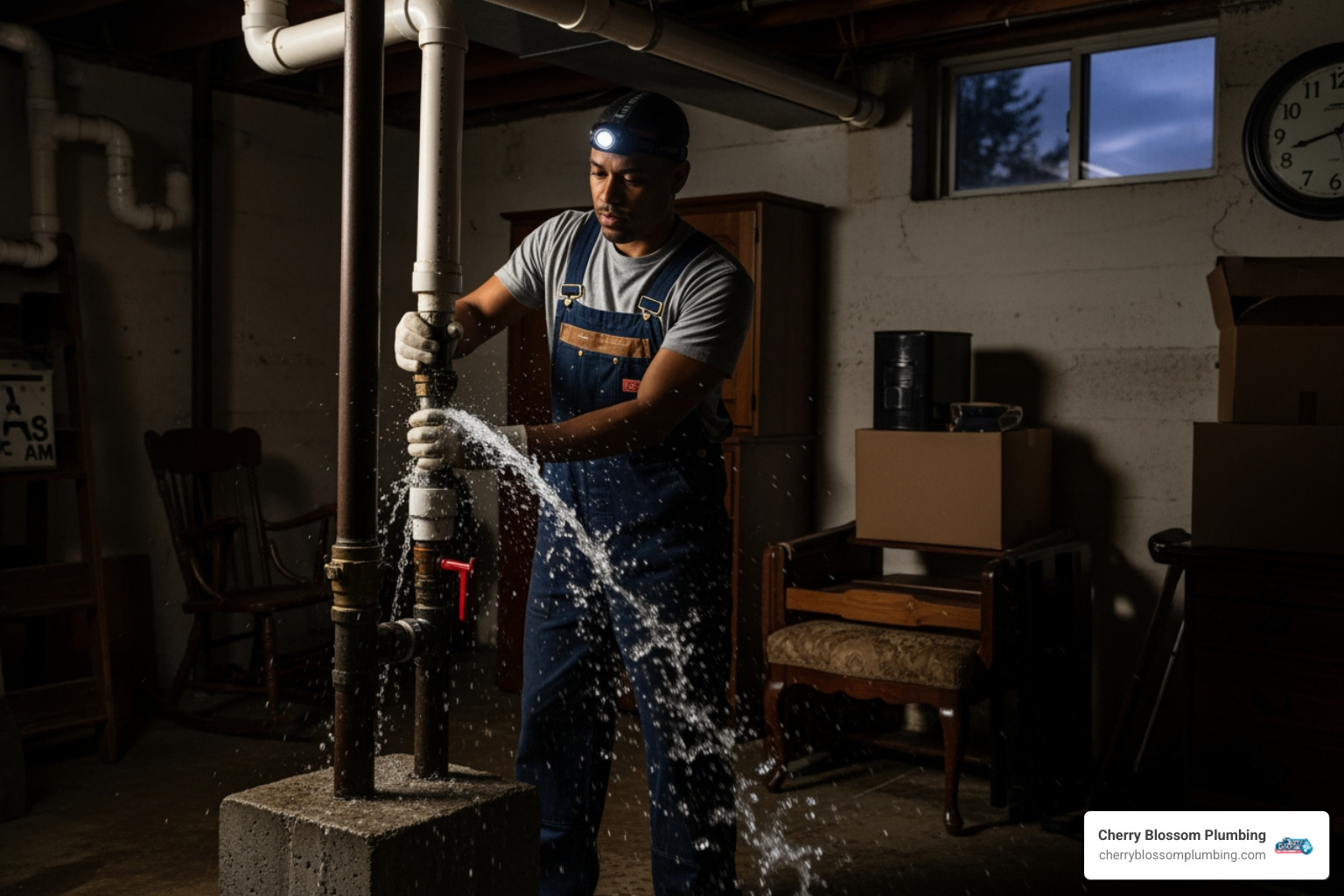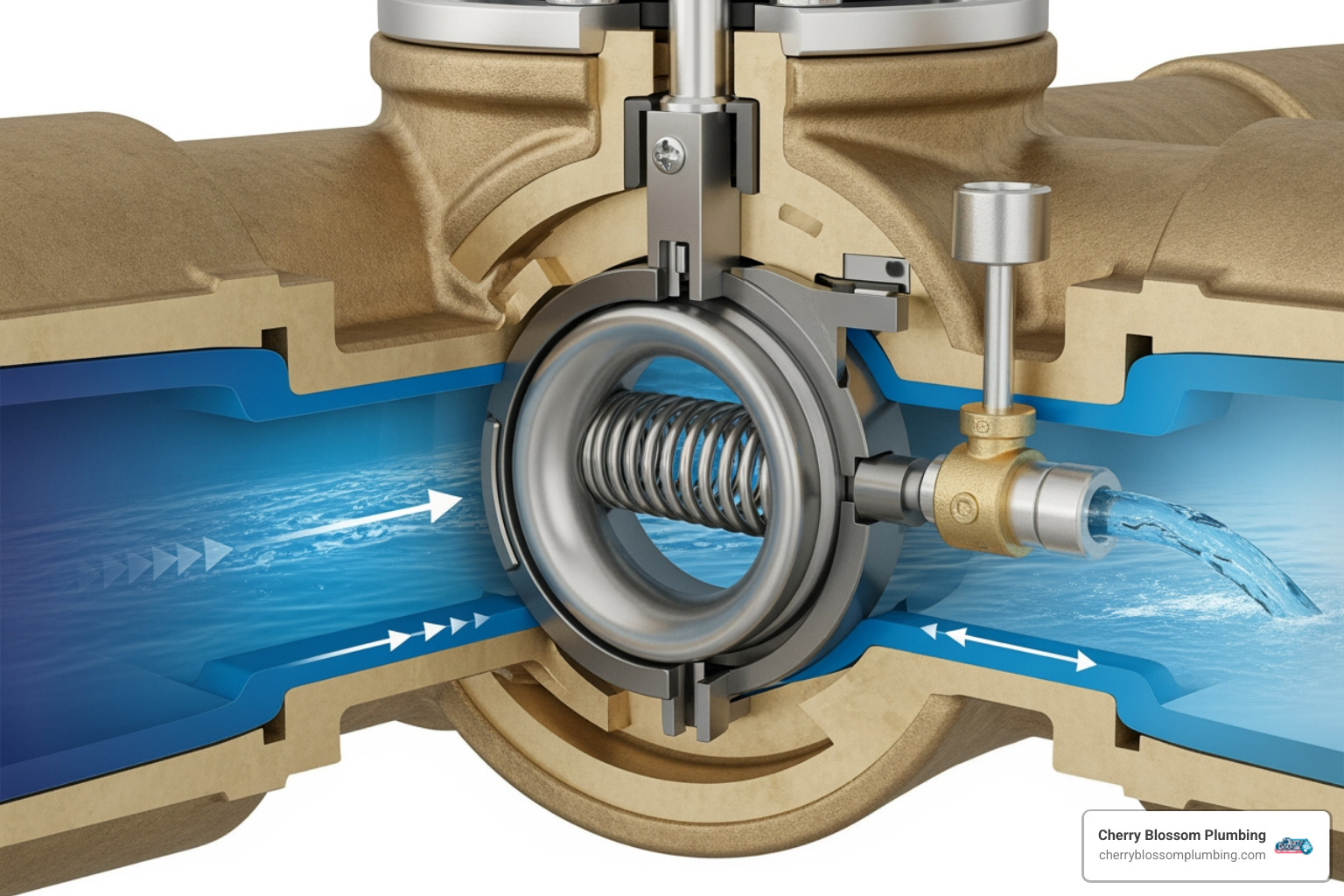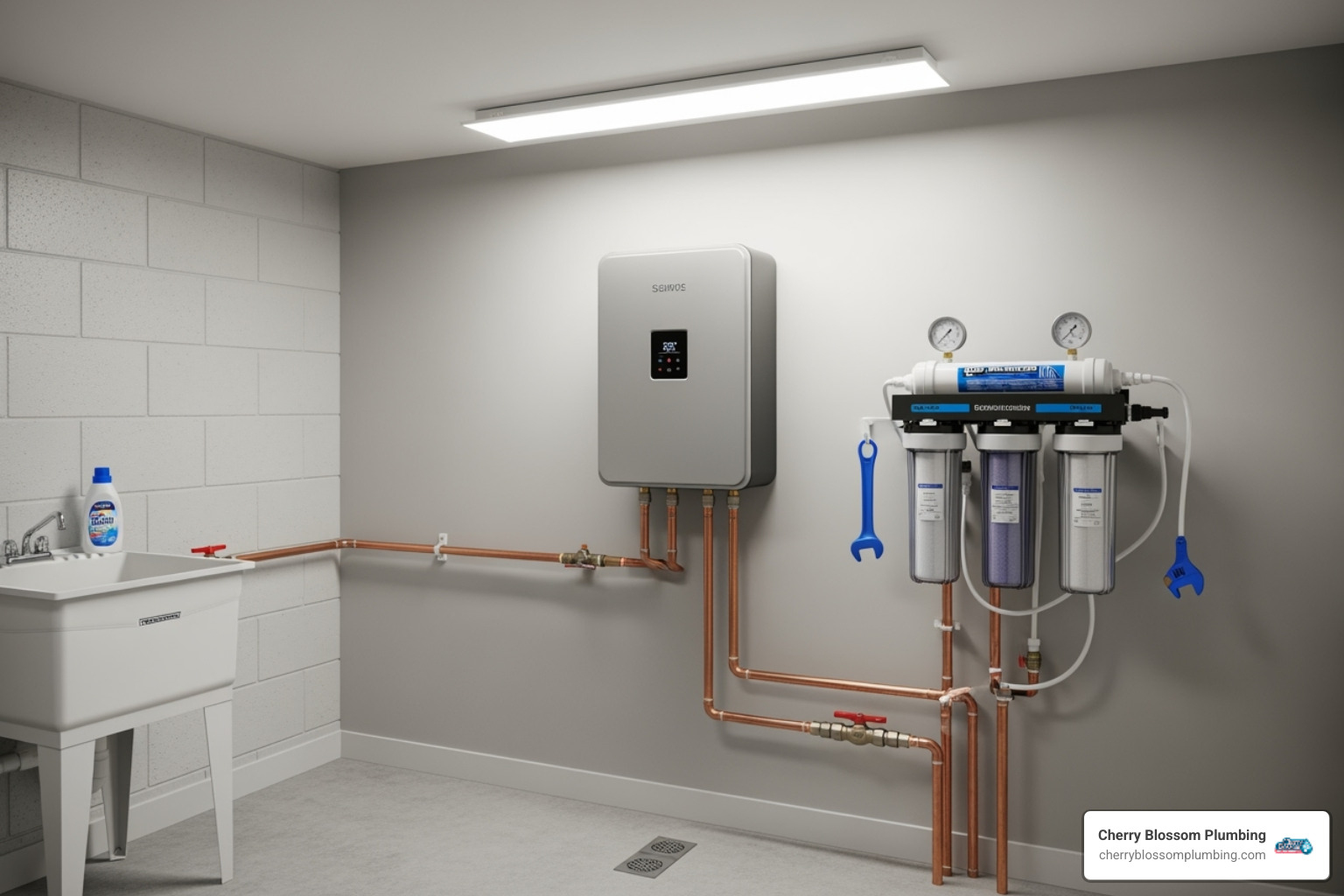
Why Your Tankless Water Heater Needs Protection
A water filter for tankless water heater systems is a device that protects your unit from scale buildup, sediment, and corrosion by treating water before it enters the heat exchanger. While your tankless heater provides on-demand hot water with great efficiency, the minerals in your water supply pose a hidden threat. In areas like Arlington and Falls Church, municipal water contains hardness minerals that create scale inside the delicate heat exchanger, reducing efficiency, increasing energy bills, and leading to premature failure. The right filtration system is your first line of defense.
Top Filter Options:
- Sediment Filters - Remove particles, dirt, and rust (5-20 micron rating)
- Scale Inhibitors - Use media like Siliphos to prevent mineral buildup
- Water Softeners - Remove hardness minerals through ion exchange for whole-home protection
Key Selection Factors:
- Your water hardness level (test your water first)
- Your tankless heater's flow rate (GPM) requirements
- Filter lifespan and maintenance frequency
- Port size compatibility (typically 3/4" or 1")
- Temperature rating (must handle up to 100-160°F)
Why It Matters: Scale buildup from hard water is the single biggest cause of tankless water heater failure. Without proper filtration, minerals like calcium and magnesium accumulate inside the heat exchanger, reducing efficiency, increasing energy costs, and shortening your unit's lifespan.
I'm Amanda Casteel of Cherry Blossom Plumbing. A common myth is that county water is fully filtered; in reality, it's chemically treated. The water filter for tankless water heater protection you install is what truly defends your equipment from contaminants. Let's explore how to choose and maintain the right filtration system for your home.
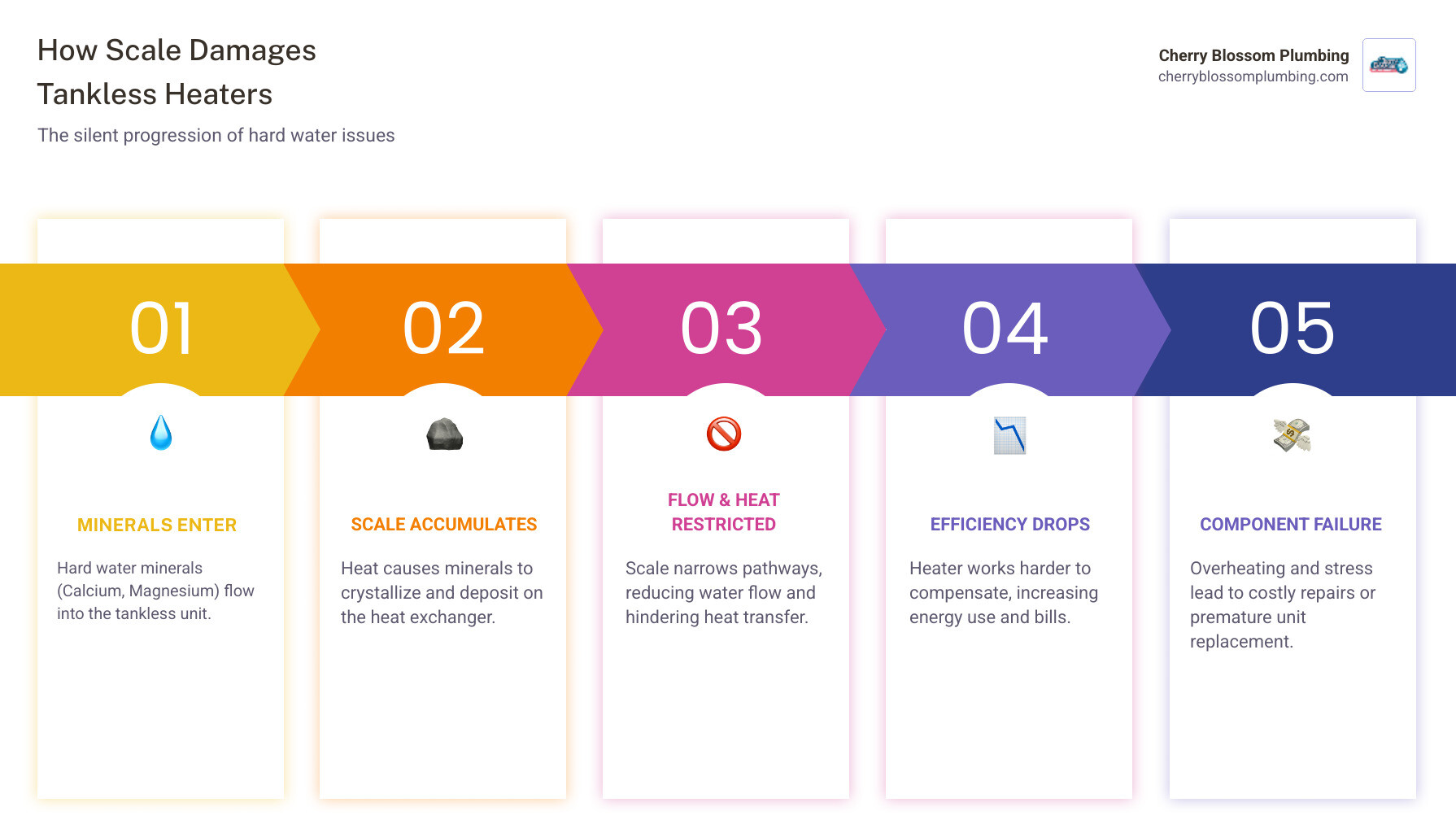
The #1 Threat to Your Tankless Heater: Why Filtration is Essential
Your tankless water heater works like a precision instrument, heating water rapidly as it flows through a compact heat exchanger. But that same heat exchanger—with its narrow passageways and hot surfaces—is the perfect environment for destructive scale to form.
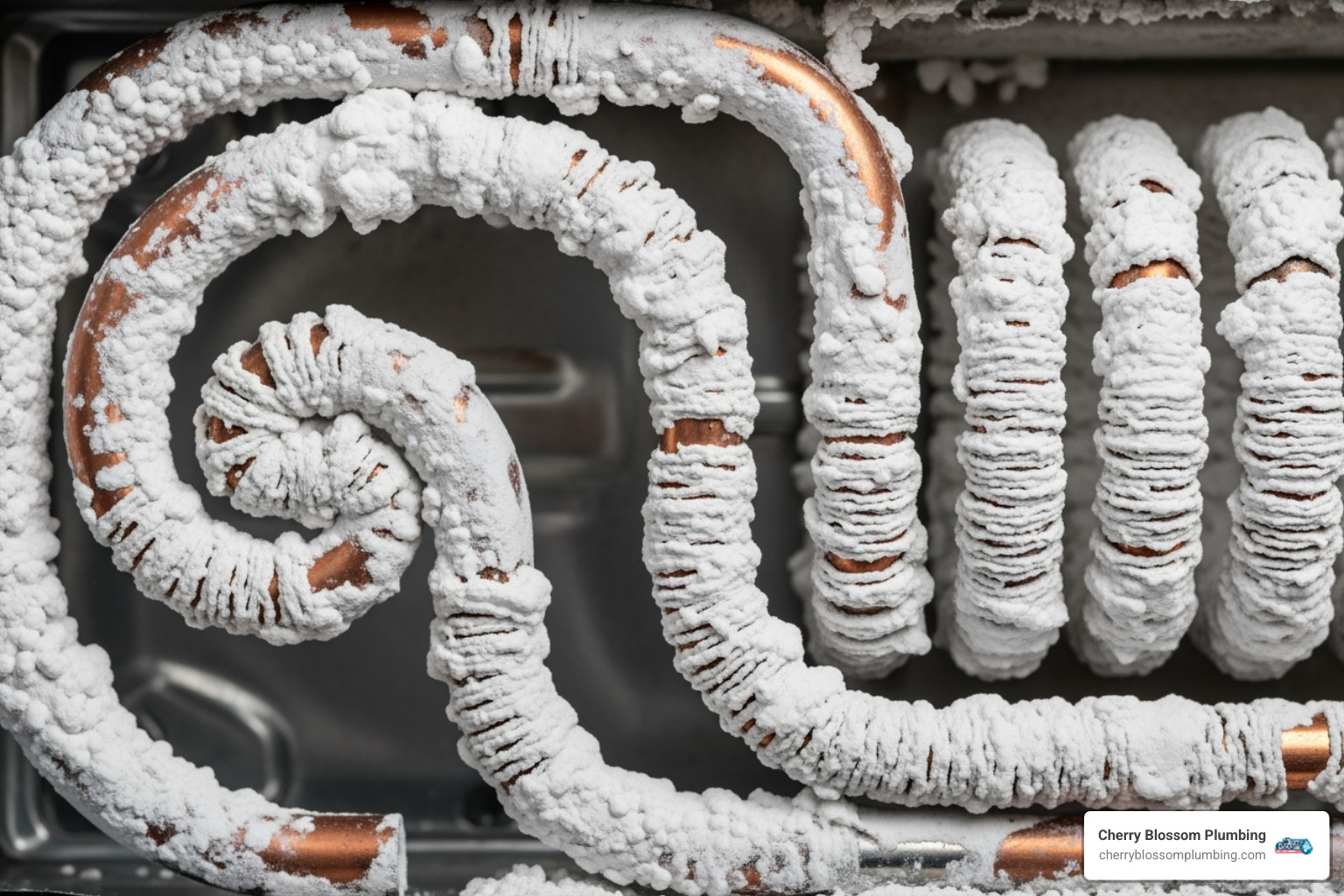
The culprits are calcium and magnesium, the hard water minerals found in most water supplies. When water heats up, these minerals crystallize and stick to hot surfaces, creating a crusty white buildup called limescale. Limescale is the single biggest cause of tankless water heater failures. We've seen units just a few years old with heat exchangers completely choked with scale—all because the homeowner didn't install a water filter for tankless water heater.
Here's how scale destroys your investment. It creates an insulating barrier on your heat exchanger, forcing the unit to work harder and run longer to heat water. This leads to reduced efficiency and higher energy bills. The extra stress causes component failure as the heat exchanger overheats and internal waterways get blocked, turning a minor issue into a major repair or complete replacement. Loose scale can also travel downstream to clog your fixtures, reducing water pressure at faucets and showerheads.
The good news is that a properly chosen water filter for tankless water heater stops this damage before it starts. You'll extend your unit's lifespan by years, maintain peak performance, and protect your plumbing system. (Our guide on how Water Softeners Saves Home Appliances explains this whole-house benefit in more detail.)
Some systems even improve your overall home water quality by removing sediment that makes water cloudy. Think of filtration as essential insurance for your tankless heater—a small investment that protects a much larger one.
Decoding Your Options: Types of Water Treatment Systems
When shopping for a water filter for tankless water heater protection, you'll find several types of systems, each with its own strengths. Understanding how they work will help you make the right choice for your home.
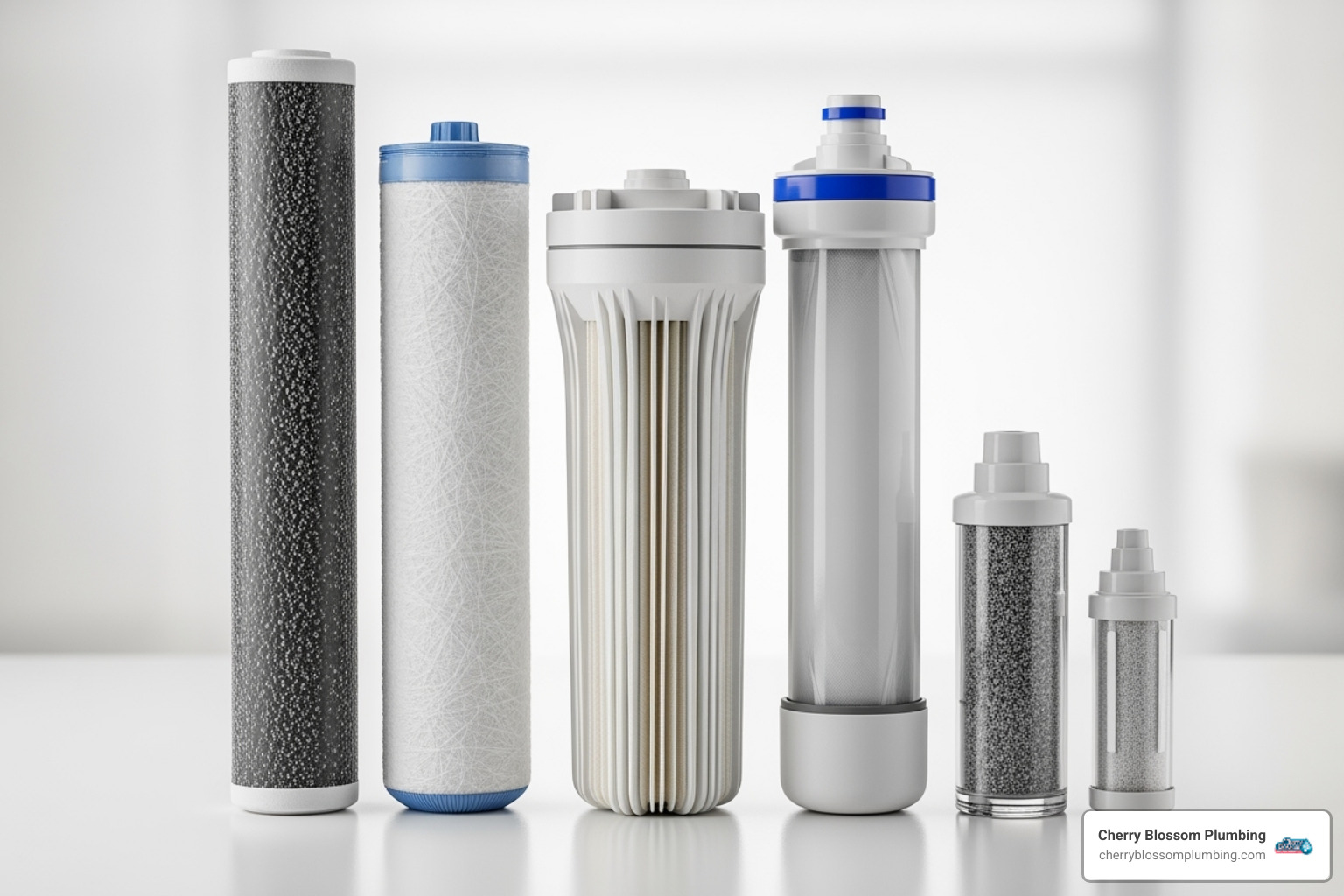
Sediment filters are your first line of defense against physical debris like sand, dirt, silt, and rust. They are rated in "microns" to indicate the size of particles they can trap (a 5-micron filter catches smaller particles than a 20-micron one). By keeping this debris out, they prevent clogs in your heat exchanger's fine pathways. Many use washable, reusable polyester, making them a budget-friendly option.
Scale-inhibiting filters, or conditioners, don't remove hardness minerals but change how they behave. Using media like Siliphos or processes like Template Assisted Crystallization (TAC), they convert dissolved minerals into microscopic crystals that won't stick to surfaces. This prevents destructive limescale from forming, making them a specialized tool for protecting your tankless heater.
Water softeners use ion exchange to completely remove hardness minerals (calcium and magnesium), swapping them for sodium or potassium ions. This provides truly soft water throughout your entire home. A water softener not only protects your tankless heater but also benefits every faucet, showerhead, and appliance, resulting in softer skin, better soap lather, and less soap scum.
| Feature | Sediment Filters | Scale-Inhibiting Filters (Conditioners) | Water Softeners (Ion Exchange) |
|---|---|---|---|
| Scale Prevention Method | No direct scale prevention; removes precursors | Converts hardness minerals to non-adhering crystals | Removes hardness minerals from water |
| Maintenance Needs | Cartridge replacement/cleaning (6-12 months) | Cartridge replacement (12-24 months) | Salt/potassium replenishment, periodic resin cleaning |
| Environmental Impact | Minimal (disposable cartridges) | Minimal (no salt discharge) | Uses salt, discharges brine water |
So which should you choose? If you have visible particles, a sediment filter is a good start. If hard water is the main problem, a scale inhibitor offers targeted protection. For a comprehensive, whole-home solution, a water softener is best.
That any filter can slightly reduce water flow, especially if undersized or clogged, so matching it to your heater's flow rate is critical. All filters also require regular maintenance, like cartridge replacements, to remain effective.
For a more detailed look at all your water treatment options, check out our Guide to Home Water Treatment Systems.
How to Choose the Perfect Water Filter for Your Tankless Water Heater
Selecting the ideal water filter for tankless water heater protection requires matching the right tool to the job by understanding your water conditions and your unit's specific needs.

Assessing Your Water Quality
This is the most critical step. We recommend a professional water test to understand what's in your pipes. The most important factor is water hardness, measured in grains per gallon (GPG). The USGS provides excellent information on water hardness. Water above 7 GPG is considered hard, making scale prevention essential. Also, look for sediment presence (cloudy water or visible particles), which indicates a need for sediment filtration. Your test may also reveal other contaminants like chlorine or iron that can influence your choice.
Considering Your Tankless Heater Model
Always check your unit's manual for recommended water treatment. Some manufacturers have specific requirements to maintain your warranty. Using an incompatible filter or neglecting treatment can void your warranty entirely. The filter must also handle your heater's flow rate requirement (GPM) without causing significant restriction. A filter with a 15 GPM flow rate, for example, works well for many models. If the filter can't keep up, you'll get lukewarm water.
For a broader understanding, see our Guide to Water Filtration Systems.
Key Features in a Water Filter for Tankless Water Heater
- Micron Rating: Indicates the size of particles a filter can capture (lower numbers mean finer filtration, from 20 down to 5 microns).
- Filter Lifespan: Varies by cartridge type and water quality, affecting maintenance schedules. Some last 6-12 months, others up to 2 years.
- Port Size: Must match your plumbing (typically 3/4" or 1") to ensure proper installation and flow.
- Certifications: Look for NSF International or ANSI compliance (like ANSI/NSF Standard 42) to ensure quality and safety.
- Pressure Gauges: A helpful feature that visually indicates when the filter needs changing, taking the guesswork out of maintenance.
- Temperature Rating: The filter must withstand hot water temperatures. Many are rated for 100°F, but some hot water filters handle up to 160°F.
Matching the Filter to Your Specific Needs
Your water test results are your roadmap. If hard water is the primary concern, a scale-inhibiting filter or water softener is essential. If you have sediment, a sediment filter is a must—often combined with a scale solution. You can choose a point-of-use system installed on the cold water line leading into the heater, or a whole-house system to treat all water entering your home. We offer comprehensive Water Filtration Systems if you want to protect your entire home.
Installation and Maintenance: A Practical Guide
Once you've selected the right water filter for tankless water heater, proper installation and a consistent maintenance routine are key. While some tasks are DIY-friendly, installing an external filter system is a job best left to professionals.
General Installation Overview
Your filter should be installed on the cold water inlet line, right before water enters the tankless unit. This acts as a gatekeeper, ensuring only treated water reaches the heater. The process involves shutting off the main water supply, cutting into the cold water line, and connecting the filter housing with durable fittings. Once connected, the water is restored while checking for leaks.
For more context on tankless setups, explore our Tankless Water Heater Installation resources.
The Importance of Professional Installation for a Water Filter for Tankless Water Heater
While cleaning a unit's small internal screen filter can be a DIY task, installing an external water filter for tankless water heater system requires professional expertise.
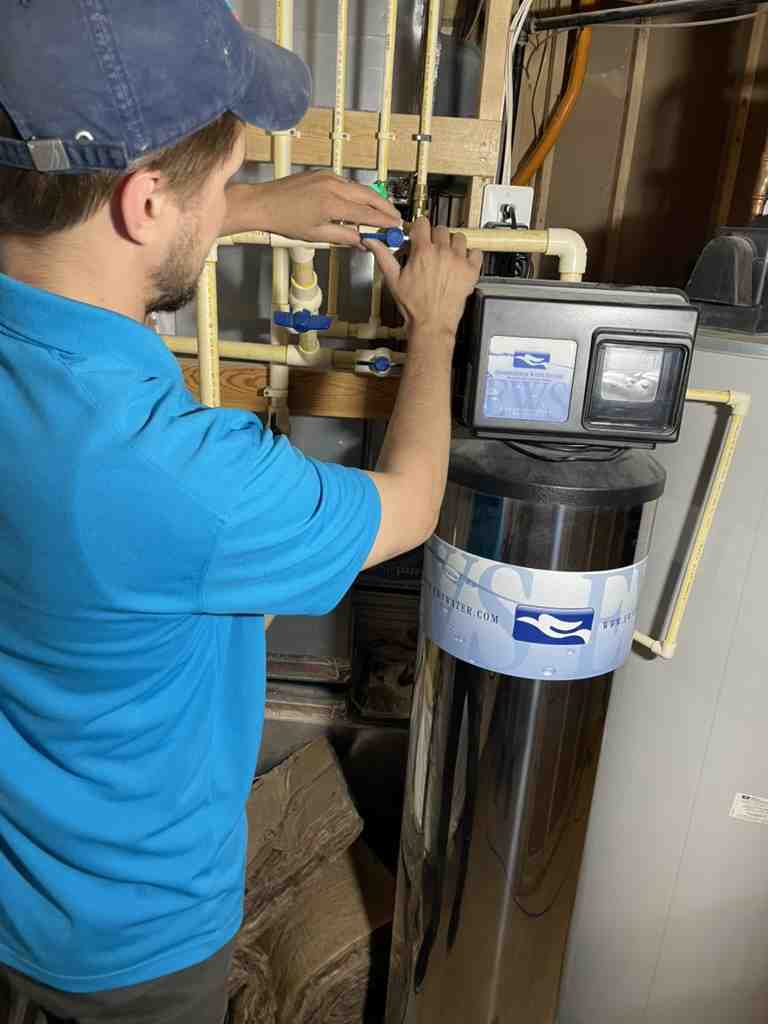
Here's why a pro is recommended:
- Proper Fit and Function: A licensed plumber will correctly size and position your filter for optimal flow, avoiding pressure issues.
- Avoiding Leaks: Professional installation ensures watertight seals, preventing costly water damage from DIY mistakes.
- Protecting Your Warranty: Many manufacturers require professional installation of auxiliary equipment to maintain warranty coverage.
- Adhering to Local Codes: Our team in Fairfax, Alexandria, and McLean stays current with all local plumbing codes, ensuring your installation is compliant and safe. If you need Plumbing Services Arlington VA, we ensure the job is done right.
Routine Maintenance and Filter Replacement
Even the best filter requires maintenance, primarily replacing cartridges on schedule.
Signs your filter needs changing include reduced water pressure, visible sediment returning to your water, or a reading on a pressure differential gauge. You might also notice decreased hot water performance.
Replacement frequency depends on filter type, water quality, and usage. Sediment filters often need changing every 6-12 months, while scale inhibitors may last 12-24 months. For example, the Atlas Filtri® unit provides twelve months of protection at 15 GPG.
Replacing the cartridge involves shutting off the water, relieving pressure, unscrewing the housing, and swapping the old cartridge for a new one. It's crucial to inspect and lubricate the O-ring seal to prevent leaks and to avoid over-tightening the housing. After replacement, restore water slowly and check for any leaks.
Regular maintenance keeps your tankless heater running efficiently. For more tips, see our Water Heater Repair Maintenance Tips.
Frequently Asked Questions about Tankless Water Heater Filters
We get a lot of great questions about protecting tankless water heaters. Here are answers to the most common ones we hear about water filter for tankless water heater systems:
Can I use any water filter with my tankless water heater?
No, you cannot use just any water filter. Tankless water heaters are high-performance machines that require a filter with specific features. It must match the heater's high flow rate (GPM) to avoid restricting water delivery and triggering error codes. It also needs a high-temperature rating to withstand heat exposure near the unit.
Most importantly, you must follow the manufacturer's specifications for filtration. Using an incompatible filter can be ineffective, damage the unit's delicate heat exchanger, and void your warranty. If you're uncertain about compatibility with your model, especially for units we service in Tankless Water Heaters Arlington VA, we can guide you to the right choice.
Will a filter for my tankless heater also soften my home's water?
It depends entirely on the type of water filter for tankless water heater you choose.
- A sediment filter only removes physical particles like dirt and rust. It does not change water hardness.
- A scale-inhibiting filter (or conditioner) prevents minerals from forming scale on hot surfaces, but it doesn't actually remove them. Your water will not feel "soft" or provide the other benefits of soft water.
- A water softener is the only system that truly softens your water. It uses ion exchange to remove hardness minerals, providing soft water throughout your entire home. This delivers benefits like less soap scum and better lathering. Learn more in our article on Water Softener Installation Benefits.
Do I still need to descale my tankless heater if I have a filter?
Yes, you will still need to descale your tankless heater periodically, but a filter will significantly reduce how often you need to do it. Even the best filters can't eliminate 100% of mineral deposits over time, especially in areas with very hard water.
Think of your filter as a powerful preventative measure, not a replacement for all maintenance. Your tankless water heater manufacturer typically recommends an annual descaling schedule. Following the manufacturer's maintenance schedule is crucial for longevity and to maintain your warranty coverage, as many require proof of regular maintenance.
With a quality filter, you might extend the time between descaling from every six months to annually or even longer, depending on your water conditions. If you notice reduced performance or it's been a while, our team can help with our Water Heater Repair Arlington VA services.
Conclusion: Protect Your Investment with the Right Filtration
Your tankless water heater is a significant investment in your home's comfort and efficiency. To protect it from damaging minerals and sediment, a water filter for tankless water heater is essential. Think of it as insurance that preserves your unit's performance and longevity. By preventing scale buildup and filtering out particles, you ensure your heater operates efficiently for years, saving you from costly repairs.
The benefits are clear: extended unit lifespan, peak efficiency, and peace of mind. We've covered how to understand your water quality, choose the right system, and the importance of professional installation and maintenance. Local water conditions in Arlington and Falls Church vary, so personalized advice makes a difference.
Don't let hard water turn your efficient heater into a source of frustration. For expert guidance and professional water treatment solutions custom to your needs, the team at Cherry Blossom Plumbing is here to help. As a family-owned, licensed plumbing service, we are committed to delivering fast, reliable, and honest work with our "WOW factor" guarantee. Let us help you keep your tankless water heater running smoothly for years to come.
Customer Testimonials
Cherry Blossom Plumbing has consistently provided top-notch service, ensuring every issue is resolved efficiently and professionally.

Latest Blog Posts
Service Areas
Proudly serving Arlington and the surrounding Virginia communities with fast, reliable plumbing solutions you can count on.





